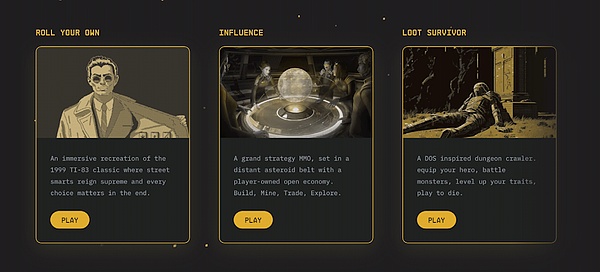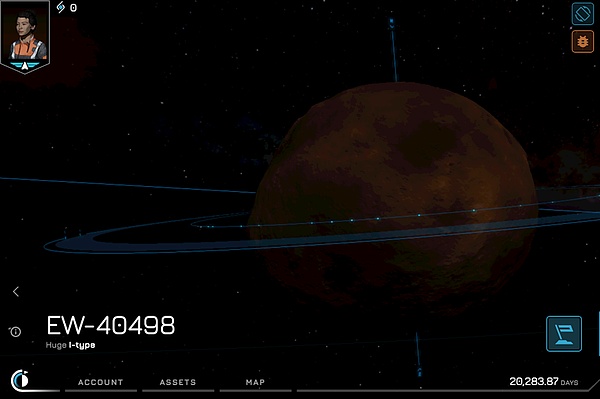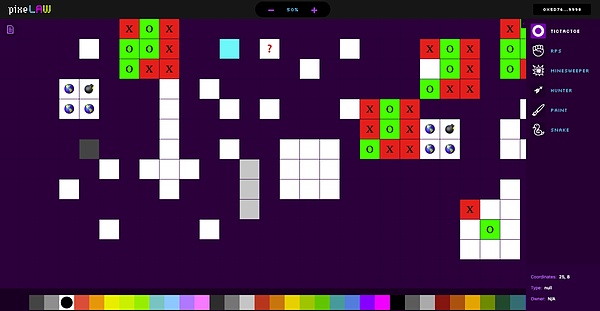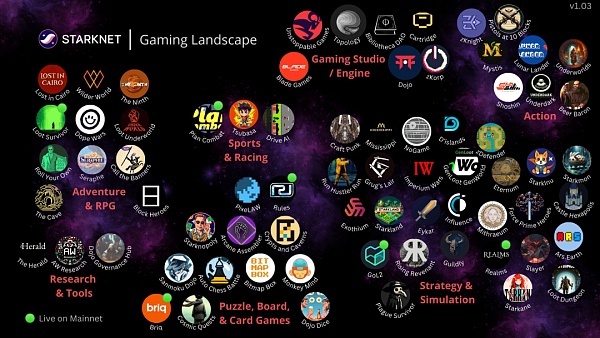Starknet 101
In our in-depth look at the Starknet game and its supporting infrastructure Before, let us first understand the background of Starknet as L2.
Starknet is a zero-knowledge (zk) Rollup. It differs from other ZKRs such as zkSync and Polygon zkEVM in that it uses STARK, rather than SNARK proofs, and it is not EVM compatible. Smart contracts on Starknet are written in the Rust-based programming language Cairo.
https://book.starknet.io/
Lack EVM compatibility can definitely cause some trouble at times. You can’t use a traditional browser wallet, and there’s no block explorer that can match the quality of Etherscan.
However, Starknet’s unique properties also provide it with features that make it ideal for full-chain gaming.
For example,Starknet offers native support for Account abstraction by enabling walletless login (Session wallet) and eliminating the need to sign transactions while playing games The operation provides the game with built-in user experience improvement space.
Starknet also completed a Quantum Leap upgrade in July 2023, which increased throughput by 10 times and significantly reduced confirmation time from minutes to seconds.
Quantum Leap is crucial to Starknet because it improves a once poor user experience to a level comparable to other L2s.
Dojo: Starknet's game engine (development framework)
As mentioned earlier, Starknet has a lot of infrastructure in place to support its ambitions for full-chain gaming.
A major part of this is Dojo, Starknet’s native on-chain game engine.
The engine is a development framework composed of contracts, tools and code libraries that makes it easier to build on-chain games .
Created in February 2023, Dojo is community-operated and maintained by a consortium of well-known Starknet teams such as Cartridge, Realms, Briq, and Toplogy (more on this later).
Dojo is centered around the Entity Component System (ECS), a data modeling approach commonly used in Web2 game development.
Like MUD, the main component of its architecture is the World contract. World is the "master contract" for the game on the entire chain, as it contains all its logic and components to help simplify its development and management.
Dojo also has multiple infrastructures to improve performance, such as: Torri (an index layer that can query game data faster) and Katana (a high-speed local Starknet node).
In the future, Dojo plans to further leverage Starknet's capabilities by integrating features such as optimistic updates, which will improve user experience by reducing wait times for transaction confirmations. , and proof of storage that can be used for cross-chain communication.
Cartridge: "Steam" on Starknet
Starknet Another major part of the full-chain gaming infrastructure is Cartridge.gg.

Game entrance in Cartridge
Cartridge is Starknet's "Steam". Because it is a game launcher where you can find and start playing different games.
This solves a major pain point for developers and gamers because it improves distribution while making it truly easy for players to Access their favorite games and discover new ones.
Cartridge currently supports Influence, Roll Your Own, Loot Survivor, Briq and Frens Lands, and has recently had its UI completely updated so the site is now Simple, smooth and easy to navigate.
The team is also actively providing additional support features across the ecosystem and is building its own games (more on that below).
Starknet-based games
Now that we know it Starknet is a core part of L2 and infrastructure like Dojo and Cartridge, so let's take a look at some of the most exciting games built on top of it.
Realms
Realms is an NFT project based on Loot IP gaming ecosystem.
There are two main games within the Realms ecosystem, managed and developed by the Bibliotheca DAO: Loot Survivor and Realms: Eternum.
Loot Survivor

"Loot Survivor" is a A roguelike survival game running on StarkNet Goerli.
In Loot Survivor, players fight monsters in a post-apocalyptic world. The game is based on strategy. When you encounter a monster, you must decide whether to fight or flee, while allocating experience points to upgrade various attributes to extend your survival time.
Overall, Loot Survivor is a lot of fun, especially if you like strategy games. It has a high aesthetic, with neon green text on a black background giving it a retro yet stylish feel.
Due to using an Arcade account, entering and playing the game is very smooth.
Similar to a burner wallet, an Arcade account is a wallet that is generated and stored in your browser. Arcade accounts can be controlled by an external wallet called a master account and support features such as withdrawal permissions and limits to help protect user funds.
On the mainnet, Loot Survivor will integrate the Play 2 Die mechanism, which is a mechanism where players can use LORDS to purchase characters (called adventurers), LORDS is an ERC-20 token used as currency in the Realms ecosystem. When the player dies, these LORDS tokens are released back into the game world.
While a game that requires an NFT purchase to play runs the risk of limiting its user base to giant whales, Play 2 Die seems like an interesting mechanic that I Would love to know how it is implemented.
Realms: Eternum
Realms: Eternum is a An upcoming MMO strategy game in which players must build and grow their own Realm while defending against attacks from others.
Each Realm in Eternum is represented by an NFT, which is also used for the governance of the Bibliotheca DAO and can be staked to earn LordS. The game has 8,000 Realms, but more players will be able to participate through the expansion of the Adventurers NFT series.
Briq

Briq is An NFT building protocol.
In Briq, players can design in a voxel-like world.
Briq is similar to Lego on a chain in that each design can be minted as an NFT and can also be disassembled or reassembled into something else. Like LEGO bricks, Briq sets come with instruction manuals that guide you on how to recreate the designs yourself.
Have used Briq to build a variety of projects including games, art, and PFP collections. One example is Ducks Everywhere, a collection of 271 different ducks that many Starknet community members use as their PFPs.
One of the best features of Briq is its onboarding capability. You can simply open their website to start designing in Briq, and there’s no need to sign a transaction or connect a wallet before you want to mint your design.
Another nice bonus is that it's easy to use for artists and non-artists alike: even I was able to make something in it!
I think Briq has a lot of potential as a primitive for creating interoperable and unique art, merchandise, and gaming experiences. Despite my lack of design skills, I'm excited to keep trying it.
Roll Your Own

Roll Your Own is a crime Themed strategy game.
Adapted from the game "Drug War", in "Roll Your Own", players release their inner Heisenberg by buying and selling drugs, hoping that Become a big shot and reach the top of the game leaderboards.
Roll Your Own is a collaboration between Cartridge (the game's development team) and Dope DAO, the organization behind Dope Wars, who are working together to build "Dope World," an ecosystem of different games leveraging Dope Wars assets.
Although it's still early days, Roll Your Own is already a lot of fun. I like the PVP aspect of the game because you trade with other players, which affects the price of different drugs. I'm also a big fan of crime-related IPs (GTA and Breaking Bad are my favorite game series and shows).
Getting into Roll Your Own is also very easy because the game uses disposable wallets, which means you don’t need to connect your own wallet or sign transactions.
While there is room for improvement in the communication and documentation aspects of the Dope Wars ecosystem, I think it has a lot to offer given the type and capabilities of the Cartridge team. Big potential to create rich lore and interesting gameplay.
Influence
"Influence" is developed by Unstoppable Games A strategy MMO.
In Influence, players compete with each other to colonize asteroids, accumulate resources, form teams, and earn SWAY (an ERC- 20 tokens).
Currently, a limited version of Influence is online on the testnet, where you can create your team and start identifying the different niches you want to conquer. planet.
These games are not the easiest to play. It is complex and one must read the documentation to better understand the gameplay.
However, I do think Influence has a lot of potential.
It has developed extensive lore about its game world, and its emerging sandbox-style gameplay could lead to exciting experiences and interesting stories .
I will be keeping a close eye on Influence's progress as it prepares for its mainnet launch, and am excited to try out the full version when it goes live.

PixeLAW

PixeLAW is an autonomous world developed based on Dojo.
Like Briq, PixeLAW is intended to be a primitive that allows developers to control the properties of programmable pixels on a grid to create programmable Different games, art and gaming experiences combined with each other.
PixeLAW won first place in the Starknet Best Use Award at the ETHGlobal Hackathon held in Paris in September 2023. The project currently creates drawing boards, Snake and rock paper scissors game.
Although still in the early stages of development, PixeLAW has the potential to become a unique design primitive. I look forward to seeing it in products.
Some other games we are paying close attention to:
There are a lot of other interesting games in development on Starknet, some of the most notable ones to me are:
Shoshin, a PVP fighting game developed by Topology.
CafeCosmos, a restaurant simulation game with a novel P2E mechanism.
Tsubasa, a football game based on Starknet L3.
Optimistic about Starknet Gaming

Starknet Gaming fam.
Image source: https://twitter.com/Starknet/status/1760565954302349432
Starknet's on-chain gaming ecosystem embodies many of its L2 attributes.
It's still rough, but it's fun, creative, and exciting.
Many promising games and design primitives are currently being built, and there is a passionate community of talented protocol and game developers.
Like MUD, Dojo, as a pioneering game engine, has the potential to build powerful network effects as developers look to leverage its supporting infrastructure and composability.
Starknet games should also benefit from strong distribution channels like Cartridge and the native capabilities of L2 itself, as account abstraction and (future) proof of storage should greatly improve users Access and in-game user experience.
However, I think Starknet games have more hurdles to overcome than other ecosystems due to their lack of EVM compatibility.
Cairo has far fewer developers than Solidity, and as a player I still don't like having to download a new wallet or use a clunky block explorer.
The best thing Starknet can do is make a lot of fun games to sidestep these concerns.
Of course, this is easier said than done, but Starknet has shown that with Briq, Roll Your Own, Loot Survivor and many other promising projects in development Signs of doing so.
All in all, I think Starknet is fully capable of becoming the leading on-chain gaming ecosystem together with MUD.
But don’t just believe me! Come into the Dojo and head over to Starknet to see it for yourself.
 JinseFinance
JinseFinance
 JinseFinance
JinseFinance JinseFinance
JinseFinance JinseFinance
JinseFinance Brian
Brian JinseFinance
JinseFinance JinseFinance
JinseFinance JinseFinance
JinseFinance Edmund
Edmund Weiliang
Weiliang Miyuki
Miyuki